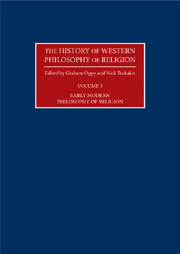Book contents
- Frontmatter
- Contents
- Editorial Introduction
- Contributors
- 1 Early Modern Philosophy of Religion: An Introduction
- 2 Niccolò Machiavelli
- 3 Martin Luther
- 4 John Calvin
- 5 Michel de Montaigne
- 6 Francisco Suárez
- 7 Thomas Hobbes
- 8 René Descartes
- 9 Ralph Cudworth
- 10 Blaise Pascal
- 11 Baruch Spinoza
- 12 John Locke
- 13 Gottfried Wilhelm Leibniz
- 14 George Berkeley
- 15 Voltaire
- 16 The Deists
- 17 Jonathan Edwards
- 18 Thomas Reid
- 19 David Hume
- 20 Denis Diderot
- 21 Immanuel Kant
- 22 Gotthold Ephraim Lessing
- 23 William Paley
- Chronology
- Bibliography
- Index
17 - Jonathan Edwards
- Frontmatter
- Contents
- Editorial Introduction
- Contributors
- 1 Early Modern Philosophy of Religion: An Introduction
- 2 Niccolò Machiavelli
- 3 Martin Luther
- 4 John Calvin
- 5 Michel de Montaigne
- 6 Francisco Suárez
- 7 Thomas Hobbes
- 8 René Descartes
- 9 Ralph Cudworth
- 10 Blaise Pascal
- 11 Baruch Spinoza
- 12 John Locke
- 13 Gottfried Wilhelm Leibniz
- 14 George Berkeley
- 15 Voltaire
- 16 The Deists
- 17 Jonathan Edwards
- 18 Thomas Reid
- 19 David Hume
- 20 Denis Diderot
- 21 Immanuel Kant
- 22 Gotthold Ephraim Lessing
- 23 William Paley
- Chronology
- Bibliography
- Index
Summary
Jonathan Edwards was born in East Windsor, Connecticut, on 5 October 1703, the son and grandson of Puritan ministers. He studied at the College of New Haven (now Yale) and tutored there before accepting the pastorate in Northampton, Massachusetts, first as assistant to his distinguished maternal grandfather, Solomon Stoddard, then for twenty-three years as his successor until he was dismissed by his congregation in 1750 over the issue of who should be admitted to the Lord's Supper. Edwards then served a mission church in Stockbridge, Massachusetts, ministering to Native Americans and also accomplishing much important writing, until called to the presidency of the College of New Jersey (now Princeton), where he died from smallpox inoculation within three weeks of his arrival, on 22 March 1758.
The resurgence of interest in scholarly studies of Edwards since Perry Miller's 1949 intellectual biography has been nothing less than remarkable. The three hundredth anniversary of Edwards' birth was celebrated at an international conference at the Library of Congress in Washington, DC. All of the twenty-six volumes of the monumental critical edition of Edwards' works by Yale University Press have now been published. The materials not included in the Yale edition are now available electronically from the Jonathan Edwards Center at Yale.
Edwards is certainly the greatest philosopher-theologian of colonial America. In the minds of some, he is perhaps one of the giants to be ranked with the greatest minds of Western Christianity, such as Augustine, Aquinas, Luther and Calvin. The greatness of Edwards, like many of his predecessors, is that he attempted to restate in a highly original way the historic tradition of the Christian faith in a lively conversation with the intellectual trends of his day.
- Type
- Chapter
- Information
- The History of Western Philosophy of Religion , pp. 223 - 234Publisher: Acumen PublishingPrint publication year: 2009

